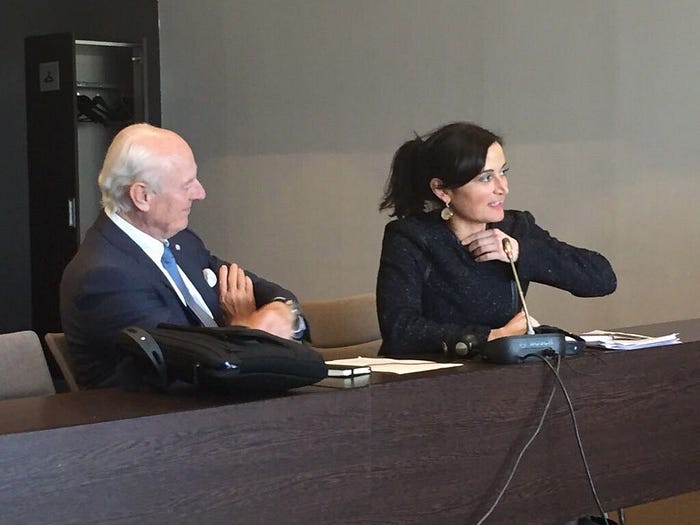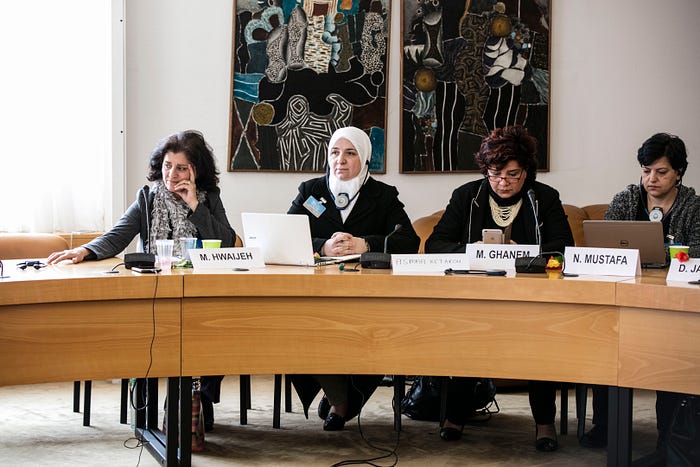“Because It’s 2018,” …and Other Reasons Why Women Must Be Included in Peace Processes

As we draw closer to International Women’s Day on 8 March, we are featuring a series of stories detailing how the UN and its Department of Political Affairs (DPA) work to include women’s participation and a gender perspective in their peace and security work. Last week, we examined how the UN has made “Women, Peace and Security” a major part of its agenda. Despite many global and regional commitments and initiatives, the number of women and gender experts involved in formal peacemaking processes remains low. DPA has been at the forefront of efforts to increase the participation of women in peacemaking and conflict prevention efforts. DPA has specialized staff — Gender Advisors and Gender Focal Points — who advise Special Envoys and Special Representatives of the Secretary-General on how to promote women’s political participation, make peace processes and prevention efforts more inclusive, and include a gender perspective in their political and conflict analysis. This week, we take a closer look at the Syrian political process, where Christina Shaheen ensures that a gender perspective is included in everything they do and that the Syrian women’s voices are heard.

What is your role as a gender adviser in your Special Political Mission and what are your main tasks?
Christina Shaheen: I work in the Office of the Special Envoy for Syria. I’m based in Geneva and my role as a gender adviser is to mainstream gender across the process, design and content of the mediation. So, that involves many different types of tasks: Oftentimes I’m in political meetings giving briefings to the Special Envoy and the rest of the mediation team on what’s happening on the ground from a gender perspective. I’m also reviewing all of the internal documents and providing technical inputs, and liaising with the Gender, Peace and Security unit in DPA and UN Women. And I’m also responsible for implementing, what I would say is a pioneering vision of the Special Envoy with respect to the inclusion mechanism he’s established to ensure the voices of Syrian women from civil society are heard in the political process, the Syrian Women’s Advisory Board (WAB). The Special Envoy has also established the Civil Society Support Room, whereby Syrians — men and women — from civil society are consulted regularly.
I am responsible primarily for working with the twelve diverse women who comprise the Syrian Women’s Advisory Board and that involves convening them every time the peace talks are in session and hearing their perspectives and channeling these perspectives into briefings to the Office, but also facilitating the direct communication between the Special Envoy and the women themselves. So, a lot of my work has to do with providing the channel between Syrian women’s groups and the Syrian women — those who are sitting on the Board and others — and the Special Envoy.
Right from the very beginning of the intra-Syrian talks process under UN Security Council resolution 2254, the Special Envoy said: ‘Women have to be there and I can’t be sure the delegations will include women.’ And he was unfortunately correct in that assessment, even though he’s also consistently advocated for women to be on the delegations and continues to do so. The Special Envoy knew that he would have to be creative with opening a political space for women’s voices; so, with the support of UN Women, he created an advisory board of Syrian women. This does not supplant women’s direct participation as decision makers on the delegations; rather it is a complementary modality to support women’s engagement in the mediation. These twelve Syrian women meet in Palais des Nations [UN Headquarters in Geneva and the venue of the intra-Syrian talks] every time the talks are in session — there are different rounds of talks, the next round will be the 10th round. The WAB meets regularly with the Special Envoy but also other members of the team including the Chief of Political Affairs, the Constitutional expert, and other advisors to the Special Envoy. As gender advisor, I sit with them, give them technical support, but also primarily hear what they have to say and try to help shape that into recommendations for the Envoy.




The origins of the WAB date before December 2015 when Security Council resolution 2254 was adopted. Syrian women’s rights advocates had been mobilizing for years for a meaningful role in the political process. UN Women, in partnership with DPA, and with support of the Governments of the Netherlands and Norway was supporting this work of Syrian women activists and civil society leaders coalescing around a unified agenda and common priorities through the Syrian Women’s Initiative for Peace and Democracy (SWIPD). I was part of the team from UN Women working on this issue at the time. The Syrian women in this coalition had been submitting recommendations and appeals to the UN since 2014, including to have a separate third party seat ‘at the table’ for Syrian women civil society representatives. In early 2016, given the complexity of the political process that was about to be initiated, the Syrian women from SWIPD also suggested the modality of an advisory board as a starting point for their inclusion. Together with UN Women, DPA and the Office of the Special Envoy responded to the request and went back to the Syrian women from the coalition for their ideas on what an advisory board would look like — which led to the Terms of Reference (TOR) and nominations for the WAB that soon began work at the first round of intra-Syrian talks in February 2016.
The routine of my daily life as Gender Advisor really depends on whether or not the talks are in session. In the middle of the talks it’s exciting because you are in the room while the Special Envoy is meeting with the delegations, and you’re thinking through the strategy with the rest of the mediation team. The other day-to-day — when talks are not in session — is also interesting to me, because in those moments there’s more time to be consulting with women’s groups, hearing what they have to say and getting their perspectives from inside Syria, in refugee communities and in the diaspora. You have more breathing time to actually think through possible ways to bring their contributions into the process.
How is including women in peace processes actually done? How do you increase participation and inclusion?
I think for highly complex political processes and conflicts, like the Syrian process, you really have to be creative with thinking about how you create these openings and spaces. And this is part of why it has been so exciting to work on the Syria team and under Staffan de Mistura, because he’s really created a space, where no one saw that space there. It didn’t exist before he decided to create this Women’s Advisory Board. The Civil Society Support Room is a separate mechanism with a different focus, but it also helps magnifying the voices of Syrian women as they are an active component of the civil society organizations present.

I think, the first lesson for me is to try to create openings where none exist. And the second thing is to also look at the different modalities for women’s inclusion, not just focused on women as advisors. The Special Envoy also tries to support, and I try to support as gender advisor, the women on the delegations and advocate for more women to be on the delegations, because ultimately, they should be decision makers there. And then also look at the women on the technical teams of the delegations and then the broader women civil society and think through: How do we support the linkages between the women serving in these different capacities and really strategize for taking those small openings, or cracks in the wall that we’ve been able to build and expand them.
What’s the greatest opportunity for your office and DPA in this field? And what’s the greatest challenge?
Because it’s a very high-profile process, I think there is an opportunity to build on what was created and the international momentum and support for the inclusion agenda and to try to further work off of that to translate it into meaningful participation. I think that the women are engaging in a meaningful way as members of the Board and as members of the delegations, but there’s more that can be done to translate it into actual influence and impact. And that is both an opportunity and a challenge. As we go further, I don’t see things being less complex, or the political resistance to women’s inclusion diminishing. In fact, I see it only rising because at some point decisions will be made about the future of the country and when it’s about power-sharing, there’s going to be even greater resistance to the idea that those who have not traditionally been involved in political negotiations — now have a role in shaping them. So, the challenge is to maintain that momentum and the political support for this agenda and to build off of the achievements we’ve already accomplished.
Even though we are not at the stage of an implementation, I think we need to be looking ahead and thinking about what can we do now to think through implementation bodies for any type of agreements reached between the parties, and monitoring of implementation particularly with respect to gender-related provisions. As we advocate for the inclusion of women’s equal rights, participation and protection in any settlement, we have to make sure that there are actual mechanisms for monitoring the implementation.
What would you like to say to people who do not think that this is a priority?
I would like to reference Canadian Prime Minister Trudeau when I say: This is a priority because it’s 2018. [laughs] I think that for those who don’t see it as a priority, it is always helpful to refer to the obligations that we are under as the UN, and it’s also sometimes helpful to cite research that shows that it’s actually operationally effective — there’s an operational effectiveness element to women’s inclusion, that if women are included, peace processes and outcomes fare better. But for me, the most powerful way to convince people who might not be otherwise inclined, is to try to facilitate a way that they can directly hear from the Syrian women. Hear their ideas and their lived experiences, and the peace work that they are doing outside of the formal Track 1 process. For me, that really shows how powerful their contributions are. And then remind them, it’s 2018.
Title picture: Press conference of the Syrian Women’s Advisory Board with Staffan De Mistura, UN Special Envoy for Syria. Geneva, 22 March 2016. UN Photo / Anne-Laure Lechat
Christina Shaheen is the Gender Advisor to the UN Special Envoy for Syria. She is responsible for providing gender analysis and recommendations, and for supporting the inclusion of Syrian women’s voices and participation in the intra-Syrian Talks. She works closely with the Syrian Women’s Advisory Board (WAB), a consultative mechanism that has been established by the Special Envoy to facilitate regular engagement between his Office and diverse Syrian women active in civil society. From 2011–2016, Ms. Shaheen worked on the Arab States team of the United Nations Entity for Gender Equality and the Empowerment of Women (UN Women), where she provided technical support to UN Women’s policy and programming in the Middle East and North Africa. From 2009–2011, she worked in the Peace and Security team for UN Women on mediation and peacebuilding with a focus on the Israel-Palestinian conflict. Before joining the UN she was a radio producer for NPR and also conducted field and research work for various organisations. Ms. Shaheen holds a Masters in International Peace Studies from Notre Dame University, and a Bachelor’s degree in Human Biology from Stanford University.
